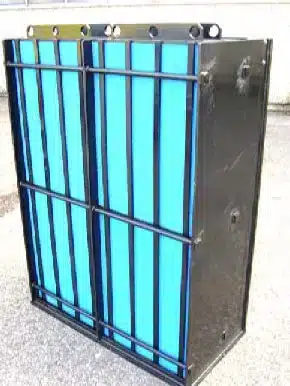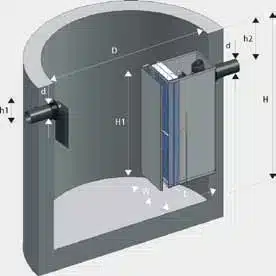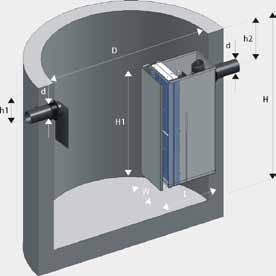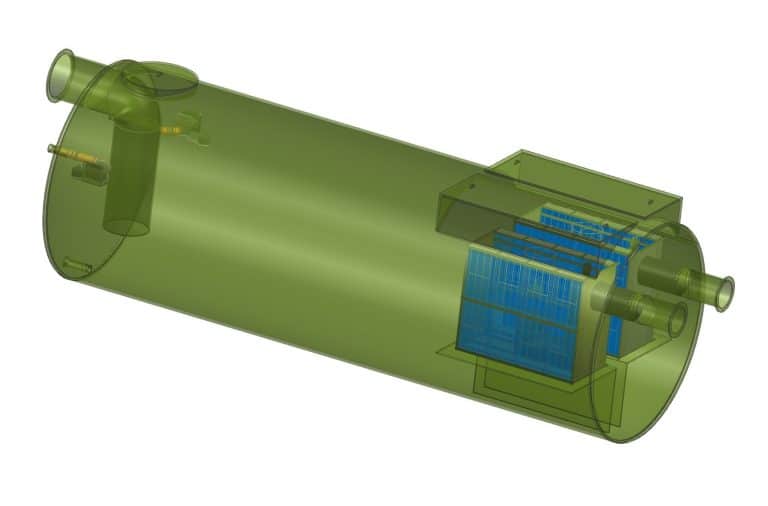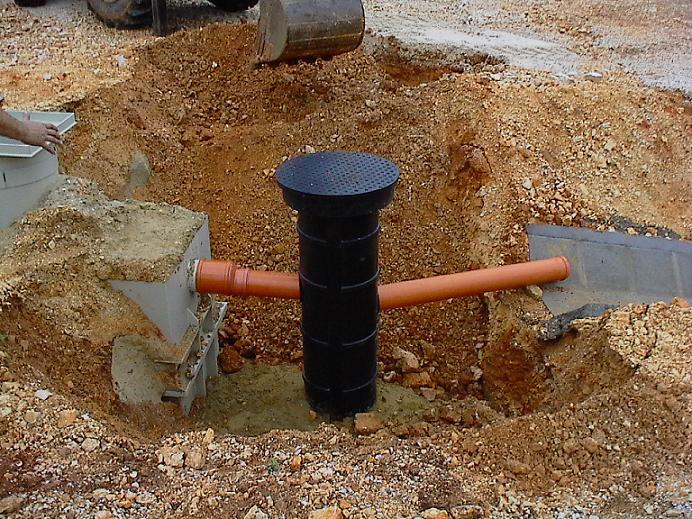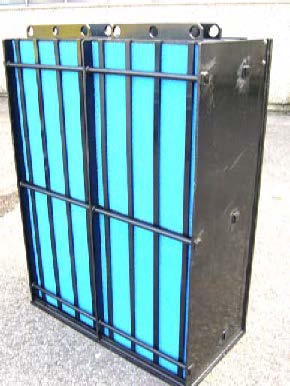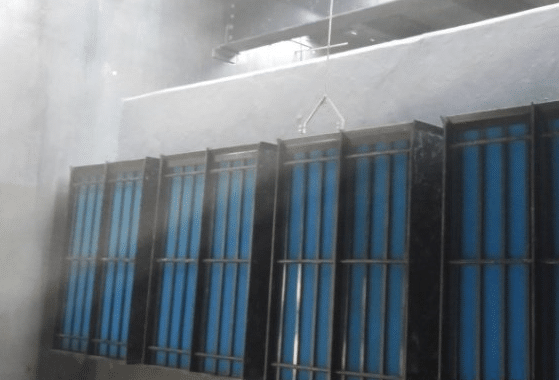Do you know about the silent guardians protecting Utah’s water from industrial pollutants? Utah Below Ground Oil Water Separators are key to keeping our environment safe. They work hard under our feet, removing harmful oils and hydrocarbons from water before it goes back into nature.
Utah’s industries have a big challenge with wastewater. But, below ground oil water separators offer a strong solution. These systems meet Utah’s tough environmental rules and treat wastewater well and affordably. By using these technologies, businesses can greatly reduce oil in water, down to just 5 parts per million (PPM).
With growing environmental worries, the need for good industrial wastewater treatment is clear. Utah’s below ground oil water separators lead the way in this effort. They let industries work responsibly and protect Utah’s valuable water. From refineries to manufacturing, these systems help businesses follow environmental laws, leading to a cleaner future.
Key Takeaways
- Freytech Inc. Below ground oil water separators are vital for Utah’s environment.
- These systems ensure industries follow strict rules.
- Advanced separators can cut oil content to 5 PPM or less.
- Good wastewater treatment is key for following environmental laws.
- Utah businesses gain from efficient and affordable separation tech.
Introduction to Below Ground Oil Water Separators in Utah
Below Ground Oil Water Separators are key in Utah’s fight against environmental harm. They manage stormwater runoff and stop oil from getting into local water. Utah’s businesses and industries use them to keep their operations clean and meet environmental rules.
Definition and Purpose
These underground tanks are made to take oil and grease out of water. They use gravity and special filters to separate pollutants from stormwater. This way, only clean water goes into the environment or sewer systems, keeping Utah’s water safe.
Importance in Utah’s Environmental Regulations
Utah has strict rules about handling oil-contaminated water. Oil-water separation systems help businesses follow these rules. They stop pollution and keep Utah’s lakes, rivers, and groundwater safe from harmful substances. Using these separators shows companies care for the environment.
Key Benefits for Industrial and Commercial Applications
Industries in Utah gain a lot from Below Ground Oil Water Separators. These systems manage stormwater well, lowering the chance of breaking environmental laws. They also protect equipment from oil damage and make drainage systems last longer. By getting these separators, businesses save money on cleanups and avoid fines for not following environmental laws.
Utah Below Ground Oil Water Separators: Types and Technologies
Utah’s industries count on advanced oil water separators to follow strict environmental rules. These underground systems vary, each aimed at removing oils and greases from stormwater runoff efficiently.
Oil interceptors are a top pick for many places. They use gravity to split oil from water, letting clean water go out while keeping oil for later. They work well for simple separation but might not be enough for very strict standards.
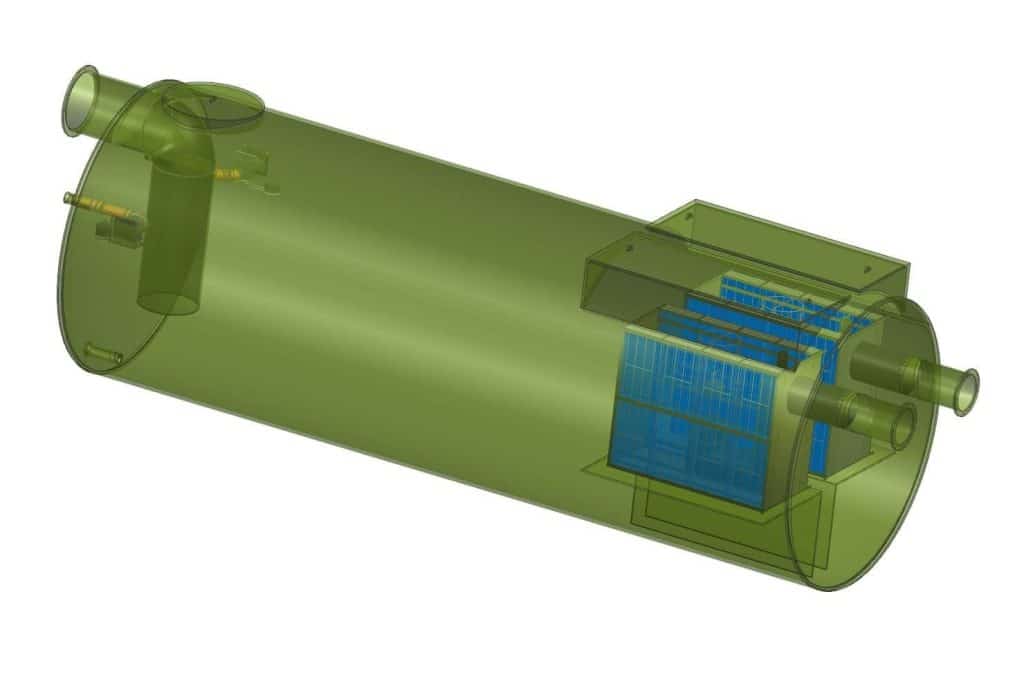
For places needing stricter standards, coalescing plate oil-water separators are better. These systems use plates to help oil droplets merge, making separation better. This tech removes smaller oil bits, leading to cleaner water.
Some makers create custom coalescing plate separators for specific sites. These units give reliable, proven performance, perfect for places under close environmental watch. The tech ensures steady meeting of Utah’s water quality rules.
Picking the right oil water separator depends on flow rate, expected contaminants, and local laws. Talking to experts can help find the best tech for your Utah site’s needs.
Design and Installation Considerations for Underground Separation Tanks
Proper design and installation of underground separation tanks are key for effective wastewater treatment. These systems need careful planning for the best performance and long life.
Site Assessment and Planning
A detailed site assessment is the first step in setting up underground separation tanks. It involves checking soil conditions, groundwater levels, and available space. Engineers must think about where to place the tank and how to access it for upkeep.
Sizing and Capacity Requirements
Finding the right size for underground separation tanks is crucial. The capacity depends on how much wastewater you expect and how fast it flows. Tanks that are too small might not manage the high volumes, while big ones can be too expensive and inefficient.
Engineers use specific data to figure out the best tank size for each site.
Material Selection and Durability
Picking the right materials for underground separation tanks is key for lasting performance. Concrete is often chosen for its strength and durability. Some companies offer precast concrete units in various sizes for different projects.
Other materials like fiberglass or steel might be better depending on the soil and local rules. The chosen material must resist corrosion, pressure, and the environment to last a long time.
Operational Principles of Oil-Water Separation Systems
Oil-water separation systems in Utah use advanced tech to clean stormwater. They mix gravitational separation and coalescing technology to remove oils and greases from water.
Gravitational separation is key to these systems. It lets oil droplets float to the top because they’re less dense than water. Coalescing technology boosts this process.
Coalescing plates are vital for better oil-water separation. They give small oil droplets a place to merge into bigger ones. As droplets get larger, they move up faster, making the system work better.
Together, gravitational separation and coalescing technology help these systems meet high environmental standards. Knowing these principles helps operators improve their systems. This ensures they follow Utah’s rules.
Compliance with Utah Stormwater and Environmental Regulations
Businesses using below ground oil water separators must follow Utah stormwater regulations. These rules protect the environment and ensure proper system operation. Understanding state requirements is key for environmental compliance.
State-Specific Requirements
Utah has strict rules for oil water separators. These cover installation, operation, and upkeep. Businesses must meet effluent standards to protect local water sources. Regular inspections help ensure systems work correctly.
Permitting Process
Getting permits is a crucial step. Companies work with state agencies to get needed approvals. The permitting process involves submitting detailed plans and system specifications. This ensures separators meet all state guidelines before installation begins.
Monitoring and Reporting Obligations
Ongoing monitoring is essential for compliance. Businesses must regularly test water quality and keep detailed records. They submit reports to show they meet environmental standards. This helps protect Utah’s water resources and ensures long-term environmental compliance.
Maintenance and Performance Optimization of Below Ground Separators
For Utah businesses, keeping below ground oil water separators in good shape is key. Regular checks and cleanings make sure these systems work right, removing oil from water. It’s important to spot and fix any issues fast.
Improving how your separator works boosts its efficiency. By making adjustments, you can meet Utah’s environmental standards better. This might mean changing flow rates or enhancing the separation process.
Good maintenance makes your separator last longer and work better. This includes cleaning out sludge, replacing old parts, and updating the system when needed. Taking care of your separator helps your business and Utah’s environment.
Regular upkeep is crucial for a separator’s efficiency. Keep detailed records of maintenance and tests. This helps you spot trends and fix problems early. With the right care, your below ground separator will keep performing well for years.
These separators are crucial in storm water systems. They process runoff to meet the US EPA’s Clean Water Act standards. With effective oily water treatment, facilities protect the environment and dodge big fines.
Conclusion: The Future of Wastewater Treatment in Utah
Utah’s wastewater treatment is changing fast. Below Ground Oil Water Separators are leading this change. They are key to meeting Utah’s tough environmental rules and better managing industrial water use.
As technology gets better, these underground systems will separate more efficiently. This means cleaner water and less harm to the environment. Utah businesses will follow water and wastewater rules better.
The future of wastewater treatment in Utah is bright. With new tech in separators, industries will get better and greener water management solutions. This change will safeguard Utah’s water for future generations.

